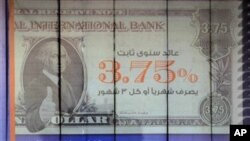Egypt's central bank has intervened to support the country's currency, buying pounds after their value fell to a six-year low against the U.S. dollar.
The central bank action on Tuesday was aimed at stabilizing Egypt's stalled economy, which has been battered by two weeks of street protests calling for the ouster of President Hosni Mubarak. The pound had fallen to near six-year low to the dollar on Monday, the day after banks reopened for the first time in a week. The size of the central bank's intervention was not disclosed, but the currency recovered to 5.87 to the dollar.
Some analysts said the central bank may have to continue selling dollars to buy pounds as foreign investors cut their exposure to pound-priced assets.
The country's stock exchange remains closed and is not scheduled to reopen until next Sunday. The value of stocks traded on the exchange fell 16 percent on the last two days it was open before the political turmoil took center stage in Cairo.
There were some signs that the country's economic activity may be stabilizing. The government said its international borrowing costs have fallen to 6.3 percent, nearly a full percentage point less than at the end of January in the first week of the protests.
On Monday, the government raised $2.2 billion in its first sale of treasury bills since political unrest began sweeping the country.
Brokers and economists say Egyptian banks purchased virtually all of the debt auctioned by the government, with international investors reluctant to enter the Egyptian market given its uncertain political climate.
Industry experts said the strong demand for the treasury bills from Egyptian banks showed the country's banking sector had enough funds to cover the short-term financial needs of the government. The central bank had hoped to raise up to $2.5 billion through the debt sale, but scaled back the size of the auction to maintain the lower interest rate, the rate of return it offers to buyers of the treasury bills.
Foreign investors previously had been major buyers of Egypt's debt, attracted by its former reputation for political stability and economic growth that was running at six percent a year before the unrest began.
But the country's unemployment rate is more than 20 percent and a French bank is already predicting that the country's economic output will fall this year. The government has acted to support one segment of the population, announcing it would hand its six million civil servants a 15 percent pay raise in April.
Some information for this report was provided by AP, AFP and Reuters.




